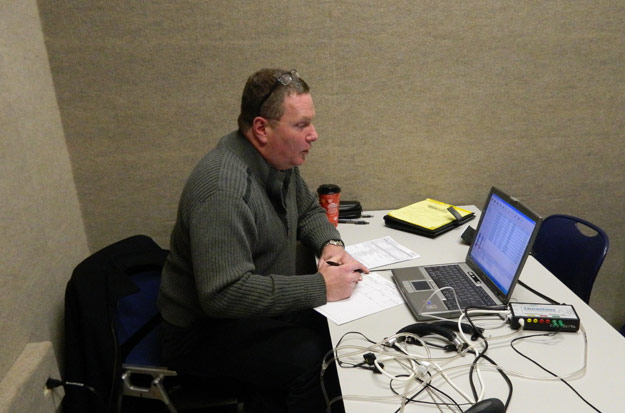
Chicago Tribune reporter Duaa Eldeib reports on the case of convicted murderer Anteleto Jones, who alleges that Chicago Police Department polygraph operator Robert Bartik, who has a documented history of misconduct, physically and mentally coerced him into falsely confessing during an unrecorded interrogation. Excerpt:
A convicted murderer from Chicago who claims he was coerced into confessing by a polygraph examiner wins a round in court in his quest to get a new trial.
An Illinois court has granted a Chicago man a path forward to pursue claims that he was physically and mentally coerced by a Chicago police polygraph examiner into falsely confessing to murder.
The confession led to Anteleto Jones’ conviction and 44-year prison sentence for a gang-related shooting in West Englewood in 2000, when Jones was 19.
An eyewitness who moved out of state after the killing has emerged to say that he did not see Jones at the scene on the night of the slaying, according to a recent Illinois appellate court opinion that allows Jones to continue his effort to have his conviction reversed or get a new trial.
The eyewitness is now the third person to claim that Jones was not involved in the killing, the justices wrote in the 64-page split decision handed down June 30. Immediately after his trial, two other men came forward to say Jones was with them elsewhere at the time of the murder of Jerry “Old Baby” Green, court records show. In addition, one of Jones’ co-defendants previously filed a sworn statement saying he was “solely responsible” for the slaying of Green, who was shot multiple times outside of his friend’s house, records show.
“The only evidence connecting defendant to this murder was his own confession, which he has consistently claimed was coerced and which is not corroborated by some of the physical evidence,” according to the June 30 opinion.
Jones claimed in court records that after denying involvement in Green’s slaying, he was asked if he wanted to take a polygraph exam — sometimes called a lie-detector test — and he agreed. Instead, Jones said, Chicago police polygraph examiner Robert Bartik “punched and shoved” him to get him to confess, before any polygraph exam was ever administered. Jones later repeated the confession in a video recording.
The appellate decision cited a letter Jones wrote to his parents in which he claimed that Bartik threatened him with “the death penalty” because Bartik allegedly said that he knew “for a fact” that Jones would fail the test. Jones wrote that “it was set up for (him) to fail,” records show.The court’s decision referred to the Tribune’s 2013 investigation into the role of Chicago police’s polygraph unit in obtaining confessions that later were found to be false. The Tribune found that the city has paid millions of dollars in damages in polygraph-related cases. Several cases that involved the polygraph unit have unraveled.
One of the cases examined by the Tribune was that of Donny McGee, who also was taken to Bartik for a polygraph as part of a high-profile murder investigation. Bartik testified that McGee began confessing before he could say a word. But the jury found McGee not guilty, and DNA evidence later excluded him.
McGee alleged that Bartik fabricated the confession and filed a lawsuit against Bartik, two detectives and the city. A jury initially awarded McGee $1.3 million, but the case was appealed and sent back for a new trial after it was determined that a juror had improperly done internet research and brought it into the jury room. The city settled for $870,000 in 2014 without admitting wrongdoing.
Read the rest of the story here. The 30 June 2016 Illinois Court of Appeals ruling in Illinois v. Jones is available here. See also the message board thread, Polygraph Abuse by the Chicago Police Department.
For years I have referred to the polygraph as an “insidious Orwellian instrument of torture” – that’s because in George Orwell’s book 1984 he says the greatest problem the Party – A.K.A. Big Brother – “is concerned to solve is… how to discover, against his will, what another human being is thinking. The scientist of today is a mixture of psychologist and inquisitor, studying with extraordinary minuteness the meaning of facial expressions, gestures, and tones of voice, and testing the truth-producing effects of drugs, shock therapy… and torture”. I would add to that list the polygraph which I have described as nothing more than a psychological billy club that will coerce a person into a confession. Even the inventor of the polygraph, Dr. John Larson referred to the polygraph test as “nothing more than the modern day third degree”. What we must understand is that the polygraph examination is not a scientific procedure, it is an interrogation pure and simple. People who are given a polygraph test in a criminal investigation must be allowed to have their attorney present during this interrogation – and a suspect must not be interrogated without his attorney being present. This would put a stop to the abuses like those listed in this article.
Most polygraph operators require a subject to sign a “permission form” prior to taking the “test”. Imbedded in this form is a waiver of the Miranda rights – attorneys should demand to be present during this polygraph interrogation or they should advise their clients to refuse the polygraph “examination”.
dirty cop